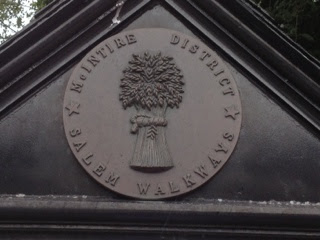| This shot was taken facing west from the top of the St. Louis Arch--St. Louis is the point of departure both before and after the War of 1812 for Westward Expansion |
Ok, after a few weeks away from the USS Constitution and the NEH program I attended, I may be ready to answer the question posed the first day of the seminar. I don't think my answer will make all the the 1812-ers happy, but it links into a more important question for me.
| This is from the deck of the USS Constitution facing the Boston Harbor. By sending it east, we will be able to take much of the west. |
Why teach the War of 1812 in the first place...
I am going to to admit that I don't always teach the War of 1812. There. I said it. In the past, I've had one semester to get through US History from the Colonies to Reconstruction. That means I barely touch on several decades of US History. In the era of instant access, I don't feel entirely bad about not teaching everything. Part of my goal is to give them tools to find the information when they actually need it.
I'm recalibrating my schedule and will have more time to teach US History and so wanted to attend the War of 1812 seminar to see what I should teach from this era. I sat through five full days of discussion and tours and I have a pretty solid grasp on the conflict. The struggle is that I'm becoming smitten not with the war itself but the legacy of the war. The war has some really interesting stories, like Andrew Jackson and the Battle of New Orleans, Dolley Madison and the Landsdowne portrait, and USS Constitution among others. But there is no real gain to the war from a strategic sense. The real gain is the development of national narrative that is quintessentially American. The war gives us:
- The Star Spangled Banner and the American flag as an icon
- USS Constitution--'Old Ironsides'
- The ascendancy of Andrew Jackson and the 'log cabin to the White House' leader narrative
- The 'White House' itself as an icon
- "We have met the enemy and he is ours."
- "Don't give up the ship!"
- Dolley Madison and saving of the Landsdowne Portrait
- 'The Era of Good Feelings'-well, they give that timestamp to Monroe, but I would argue Madison hands it to him on a silver platter
| This model of the USS Constitution was presented to its captain after its success again the HMS Guerriere and HMS Java in 1814. It model is part of a maritime exhibit at the Peabody Essex Museum and has been used by historians to refurbish the actual boat. |
| This is the front entrance to the new house. The challenge of photographing The Hermitage is that the trees which line the entry to the mansion are so large you get only a third of the house in your viewfinder. |
I am playing with teaching the war in the context of westward expansion. Let me make sure I'm understood: it is not a war for expansion and we were expanding just fine before the war. The issues with the Native Americans over expansion is tangential to the war (See, I was paying attention in class, Dr. Hickey.). The real issue was the impressment of sailors. There is a notable Indian Wars segment to the war, but it's a lesser concern. The war is important because of what happens after the war and how the war is used by later generations as we continue to cobble a national identity together. Prior to the war, there is expansion; after the war it is expansion on steroids. The affect of the War of 1812 is that this new national identity requires a larger nation. That sends thousands out west, beyond the Northwest Territory to the 'new' west. The result of the war is that we begin to think about our 'God-given right' to 'sea from shining sea'--a Manifest Destiny. That sense has a shadow side to it which includes Jackson's Trail of Tears, the development of the Antebellum sensibility and rhetoric, as well as tensions with Spain and then Mexico.
We should care about the War of 1812 and I will let the naval historians, those smitten with the interior and Great Lakes theater have their day. I wonder, however, what would happen if I taught it backwards...the legacy first and then fill in the blanks with the great narrative stories of the war. Hmmm. I'll keep you posted.







